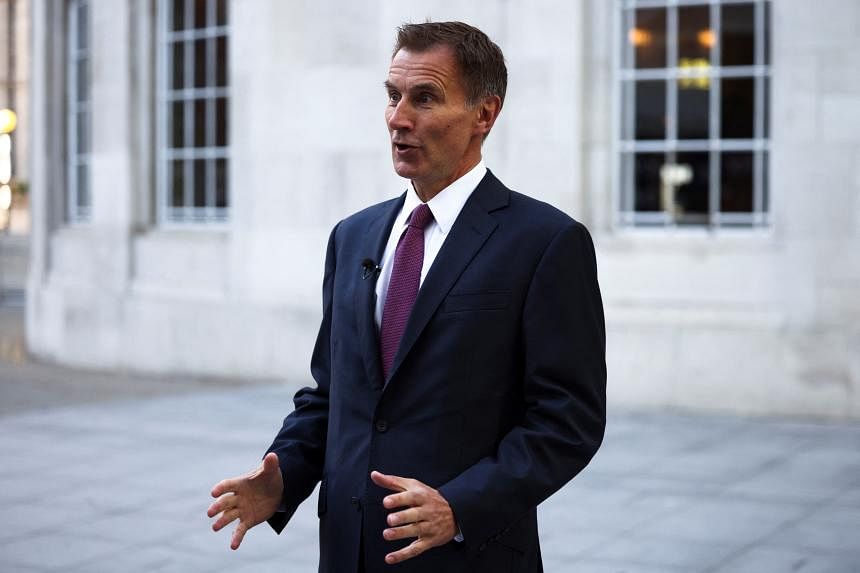LONDON - New British Finance Minister Jeremy Hunt on Monday reversed nearly all of Prime Minister Liz Truss’ mini-budget that had sparked market turmoil, and reined in a vast energy subsidy plan, saying the country needed to rebuild investor confidence.
Mr Hunt, appointed last Friday to fix the public finances after Ms Truss’ economic plan hammered the value of British assets, said the country needed to generate confidence and stability before it could seek to grow the economy.
He said changes to planned tax cuts would raise £32 billion (S$52 billion) every year. Government spending cuts will also be required to narrow a hole in public finances that the Sunday Times reported was as big as £72 billion.
“I remain extremely confident about the UK’s long-term economic prospects as we deliver our mission to go for growth,” he said in a televised clip. “But growth requires confidence and stability, and the United Kingdom will always pay its way.”
“There will be more difficult decisions to take on both tax and spending as we deliver our commitment to get debt falling as a share of the economy over the medium term,” Mr Hunt said.
Sterling soared more than 2 per cent against the dollar and by 1.2 per cent versus the euro in late afternoon London trading, a few hours after Mr Hunt’s announcement.
In response to Mr Hunt’s plans, Ms Truss said on Monday the government was charting a new course for growth, as she emphasised the need for stability.
“The British people rightly want stability, which is why we are addressing the serious challenges we face in worsening economic conditions,” Ms Truss said on Twitter.
“We have taken action to chart a new course for growth that supports and delivers for people across the United Kingdom.”
Mr Hunt later told Parliament he was forming an Economic Advisory Council to provide him with “independent expert advice” as he tries to lead the economy out of a crisis in confidence among investors. The council’s members would be Mr Rupert Harrison, who was a top aide to former finance minister George Osborne; Dr Gertjan Vlieghe and Dr Sushil Wadhwani, who both served on the Bank of England’s Monetary Policy Committee; and Ms Karen Ward, chief market strategist for EMEA at JP Morgan Asset Management.
Together with earlier U-turns, Monday’s decisions reverse almost all of the £45 billion in tax cuts and giveaways Ms Truss announced in September.
This leaves Ms Truss, Britain’s fourth Prime Minister in six years, battling to survive in Downing Street less than six weeks after she came to power promising bold tax cuts and deregulation to reignite economic growth.
Ms Truss did not appear in Parliament on Monday to answer a question about why former finance minister Kwasi Kwarteng was sacked last week, drawing accusations from the opposition Labour Party that she was “scared of her own shadow”.
Such was the taunting from opposition parties that at one point, Ms Penny Mordaunt, the leader of the House of Commons standing in for Ms Truss, insisted that: “The Prime Minister is not under a desk.”
Ms Mordaunt said the reason for the PM’s absence was “very genuine” but she did not elaborate.
Ms Truss arrived in Parliament at the very end of the debate to listen to Mr Hunt give his statement on the economy. She did not speak and left again after less than half an hour.
Labour had asked Ms Truss to make a statement “on the replacement of the Chancellor of the Exchequer during the current economic situation”, but Ms Mordaunt answered for the government instead.
“The PM is detained on urgent business,” she said, drawing laughter from opposition party lawmakers.
Ms Truss has been forced to reverse course after markets reacted violently to her plan, hammering the value of the pound and government bond prices, and forcing the Bank of England to intervene to protect pension funds.
BOE stuck to its schedule of ending the support last Friday, adding to the pressure on Mr Hunt over the weekend to find ways to reduce spending before the bond markets reopened.
Ms Truss’ spokesman was asked at a daily briefing how the Prime Minister could retain any credibility after she reversed course on the programme that secured her election by party members.
He said she was listening to the public, her colleagues and to the advice of the markets.
“She is making the necessary difficult decisions to change our approach so we can provide the economic stability and maintain that stability of leadership which is important as well,” he said.
Her about-turn has angered those lawmakers who supported her, and further encouraged those who opposed her to try to find a way of getting her out of power.
While Mr Hunt had been expected to reverse some of the tax cuts, the change to the energy support scheme had been unexpected.
Ms Truss had announced a two-year subsidy scheme to support households and businesses through the period of surging energy prices, costing £60 billion in six months.
Mr Hunt said on Monday that the scheme would now run until April.
After that, the government will review the best way forward, to come up with a targeted scheme that will “cost the taxpayer significantly less than planned”.
Mr Hunt would still deliver a fuller medium-term fiscal plan as scheduled on Oct 31, alongside forecasts from the independent Office for Budget Responsibility, the Treasury said. REUTERS

